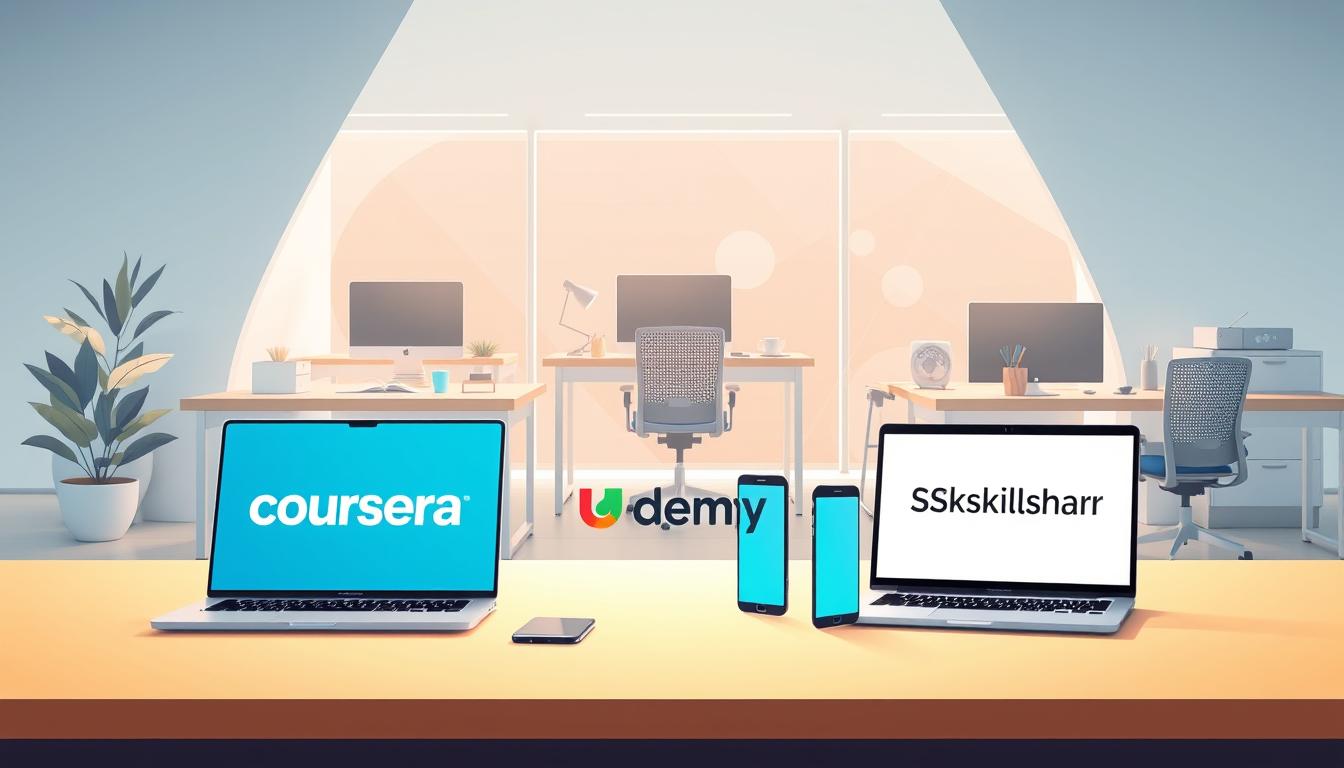Your 2025 guide to the best e-learning platforms. Compare top sites like Coursera, Udemy, and Skillshare to start learning online today
The world of online learning has revolutionized the way we acquire new skills and knowledge. With numerous e-learning platforms available, choosing the right one can be overwhelming.

Coursera, Udemy, and Skillshare are three major players in the online learning landscape. Each offers a unique set of courses and features that cater to different needs and preferences.
In this article, we will explore these e-learning platforms and compare their offerings to help you make an informed decision.
Key Takeaways
- Overview of Coursera, Udemy, and Skillshare
- Comparison of their course offerings and features
- Insights into their pricing models and subscription plans
- Tips for choosing the best platform for your needs
- Understanding the benefits of online learning
The Rise of Online Learning in the Digital Age
In the digital age, online learning has emerged as a powerful tool, democratizing access to education. This shift has been driven by technological advancements and the increasing demand for flexible learning options.
How E-learning is Transforming Education
E-learning is transforming education by providing flexible learning options that cater to different learning styles and schedules. Online platforms offer a range of courses, from academic subjects to professional skills, making it easier for individuals to acquire new knowledge and competencies.
Benefits of Learning Online
Learning online offers numerous benefits, including flexibility and accessibility. Students can learn at their own pace, revisit complex topics, and access course materials from anywhere in the world. This flexibility is particularly beneficial for those with busy schedules or limited access to traditional educational institutions.
Moreover, online learning platforms often provide interactive learning experiences, including videos, quizzes, and discussion forums, which enhance engagement and understanding.
Understanding E-learning Platforms Coursera, Udemy, Skillshare Reviews
As online learning continues to grow in popularity, understanding the nuances of e-learning platforms like Coursera, Udemy, and Skillshare becomes increasingly important. These platforms have transformed the educational landscape, offering diverse learning experiences tailored to various needs and preferences.
What Makes a Great E-learning Platform
A great e-learning platform is characterized by its ability to provide high-quality, accessible, and engaging educational content. Coursera, Udemy, and Skillshare each excel in different areas, whether it’s through academic partnerships, a wide range of courses, or a focus on creative skills.
Key Features to Look For
When choosing an e-learning platform, several key features should be considered:
- Course Variety: A diverse range of subjects and courses.
- Instructor Expertise: Qualified instructors with real-world experience.
- Interactive Learning Tools: Engaging features like quizzes, discussions, and projects.
- Accessibility: User-friendly interface and mobile compatibility.
| Platform | Course Variety | Instructor Expertise |
|---|---|---|
| Coursera | Wide range of academic courses | University professors and industry experts |
| Udemy | Extensive library of courses on various subjects | Experienced professionals and specialists |
| Skillshare | Focus on creative and practical skills | Industry professionals and creatives |
By understanding these key features and what makes a great e-learning platform, learners can make informed decisions about their educational pursuits.
Coursera: A Comprehensive Review
Coursera’s mission to make high-quality education accessible to everyone has driven its growth into a robust online learning ecosystem. With a wide range of courses and specializations, Coursera has become a popular choice among learners worldwide.
Platform Overview and History
Coursera was founded in 2012 by two Stanford University professors, Andrew Ng and Daphne Koller. Initially, the platform focused on offering massive open online courses (MOOCs) from top universities. Over the years, Coursera has expanded its offerings to include specializations, professional certificates, and online degrees.
Course Quality and Academic Partnerships
Coursera partners with over 200 top universities and organizations globally, ensuring that its courses are of high quality and relevance. The platform offers courses in various fields, including business, technology, and creative arts.
Pricing Structure and Subscription Options
Coursera offers both free and paid content. While many courses are available for free, learners can pay for certificates upon completion. Coursera also offers a subscription model called Coursera Plus, which provides access to a vast majority of courses and specializations for a yearly fee.
Free vs. Paid Content
The free content on Coursera allows learners to access course materials, but it often comes with limitations, such as not being able to earn a certificate. Paid content, on the other hand, provides a more comprehensive learning experience, including graded assignments and certificates upon completion.
Coursera Plus Subscription
Coursera Plus is a yearly subscription that offers learners unlimited access to over 7,000 courses, specializations, and professional certificates. This subscription is ideal for learners who plan to take multiple courses throughout the year.
Strengths and Limitations
One of Coursera’s significant strengths is its academic partnerships, which ensure high-quality content. However, one limitation is that some learners might find the lack of direct interaction with instructors and peers to be a drawback.
| Feature | Description | Benefit |
|---|---|---|
| Academic Partnerships | Collaborations with top universities | High-quality courses |
| Coursera Plus | Yearly subscription model | Access to a vast course library |
| Free Content | Access to course materials | Exploratory learning |
Udemy: The Marketplace for Skills
Udemy has revolutionized the way we learn new skills by providing a vast marketplace for online courses. With a wide range of subjects covered, Udemy connects learners with experts from around the world.
Platform Overview and Business Model
Udemy operates on a business model that empowers instructors to create and sell courses on various subjects. This model allows for a diverse range of courses, from technology and business to creative arts.
Course Variety and Instructor Qualifications
Udemy boasts an extensive library of courses, with instructors coming from diverse backgrounds, including industry experts and academics. The platform’s emphasis on instructor freedom means that course quality can vary, but Udemy’s rating system helps learners make informed decisions.
Pricing and Discount Strategy
Udemy is known for its competitive pricing and frequent discounts. The platform allows instructors to set their course prices, but Udemy often runs promotions that significantly reduce the cost for learners.
Individual Course Purchases
Learners can buy courses à la carte, allowing them to pick and choose the skills they want to develop without committing to a subscription.
Sales and Promotions
Udemy regularly hosts sales and offers discounts on its courses, making it an attractive option for those looking for affordable learning opportunities.
Strengths and Limitations
Udemy’s strengths include its vast course selection and user-friendly interface. However, the platform’s quality control can be inconsistent, and some courses may lack depth or have outdated content.
As “the largest online learning platform”, Udemy continues to evolve, offering new features and improving its services to meet the needs of its growing user base. According to
“Udemy’s success is rooted in its ability to adapt and innovate,”
a testament to its commitment to providing high-quality learning experiences.
Skillshare: Creative Learning Community
In the realm of online learning, Skillshare has carved a niche for itself by focusing on creative education. With a wide array of courses in creative fields, Skillshare is an ideal platform for those looking to enhance their skills in areas such as graphic design, photography, and writing.
Platform Overview and Focus Areas
Skillshare is designed to foster a community of creatives who learn through hands-on projects. The platform’s focus areas include graphic design, photography, writing, and other creative disciplines. By emphasizing practical skills, Skillshare equips learners with the tools needed to succeed in their chosen creative fields.
Project-Based Learning Approach
One of the standout features of Skillshare is its project-based learning approach. Rather than relying solely on lectures, the platform encourages students to apply their knowledge by working on real-world projects. This method not only reinforces learning but also helps build a portfolio of work that can be showcased to potential employers.
Subscription Model and Pricing
Skillshare operates on a subscription-based model, offering users access to its vast library of courses for a monthly or annual fee. This pricing structure is advantageous for learners who wish to explore multiple subjects without incurring additional costs per course.
Premium Membership Benefits
Skillshare’s premium membership offers several benefits, including access to exclusive content, offline viewing capabilities, and the ability to earn a certificate upon course completion. These features enhance the overall learning experience and provide added value to subscribers.
Free Trial Options
For those hesitant to commit, Skillshare offers a free trial period, allowing potential subscribers to explore the platform and its offerings before deciding on a paid subscription.
Strengths and Limitations
Skillshare’s strengths lie in its creative focus, project-based learning, and community-driven approach. However, the platform may not be as comprehensive in more technical or academic fields. The following table summarizes Skillshare’s key features:
| Feature | Description | Benefit |
|---|---|---|
| Project-Based Learning | Hands-on projects to apply knowledge | Builds practical skills and portfolio |
| Subscription Model | Access to vast course library | Cost-effective for exploring multiple subjects |
| Premium Membership | Exclusive content and offline viewing | Enhanced learning experience |
By understanding Skillshare’s strengths and limitations, learners can make informed decisions about whether this platform aligns with their creative learning goals.
Course Quality Comparison
When it comes to online learning, the quality of courses can significantly vary across platforms. The effectiveness of an e-learning platform is often determined by the quality of its courses, which is influenced by several key factors.
Instructor Credentials and Expertise
The expertise and credentials of instructors play a crucial role in determining course quality. Coursera, for instance, partners with top universities worldwide, ensuring that courses are taught by experts in their fields. In contrast, Udemy allows experts to create courses, but the quality can vary since instructors’ backgrounds aren’t vetted as rigorously. Skillshare focuses on creative skills, with instructors often being professionals in their areas of expertise.

Production Value and Learning Materials
The production value of courses, including video quality, learning materials, and interactive elements, significantly impacts the learning experience. Coursera and Skillshare are known for their high production values, with well-produced videos and comprehensive learning materials. Udemy courses vary in production quality, as it depends on the instructor’s resources and expertise.
Student Feedback and Ratings Systems
Student feedback is invaluable for assessing course quality. All three platforms allow students to rate courses and leave feedback. Udemy and Skillshare use this feedback to improve course offerings, while Coursera uses it to maintain high standards among its partnered institutions.
As noted by a learning expert, “The quality of online courses is not just about the platform; it’s about the instructors, the content, and how it’s delivered.” This highlights the multifaceted nature of course quality comparison across e-learning platforms.
Specialized Course Categories
The e-learning platforms Coursera, Udemy, and Skillshare offer a diverse range of specialized course categories that cater to different interests and professional needs.
Business and Professional Development
Coursera stands out for its business and professional development courses, often in partnership with top universities. Udemy also offers a wide range of business courses, focusing on practical skills. Skillshare, while more creatively inclined, provides courses on entrepreneurship and project management.
Technology and Computer Science
Udemy is renowned for its extensive technology and computer science courses, covering programming languages, software development, and more. Coursera also offers a significant number of tech-related courses, often with a theoretical foundation. Skillshare focuses on creative tech skills like web design and digital graphics.
Creative Arts and Design
Skillshare excels in creative arts and design, offering a vast array of courses on graphic design, illustration, photography, and more. Udemy and Coursera also provide courses in this category, though they are not as extensive as Skillshare’s.
Personal Development
All three platforms offer courses on personal development, including mindfulness, productivity, and wellness. Coursera and Udemy tend to have more structured courses, while Skillshare focuses on creative personal growth.
| Platform | Business & Professional Development | Technology & Computer Science | Creative Arts & Design | Personal Development |
|---|---|---|---|---|
| Coursera | Extensive university-partnered courses | Significant tech-related courses | Some courses available | Structured courses available |
| Udemy | Practical business skills courses | Extensive programming and tech courses | Courses available, not as extensive | Variety of courses available |
| Skillshare | Entrepreneurship and project management | Creative tech skills like web design | Extensive courses on graphic design, etc. | Creative personal growth courses |
User Experience and Interface
A seamless user experience is essential for e-learning platforms to keep learners engaged and motivated. In this section, we will examine the user experience and interface of Coursera, Udemy, and Skillshare, focusing on their accessibility, navigation, and learning tools.
Mobile and Desktop Accessibility
All three platforms prioritize accessibility across different devices. Coursera and Udemy offer robust mobile apps, while Skillshare also provides a mobile-friendly website. This allows learners to access courses on-the-go, enhancing their overall learning experience.
Navigation and Course Discovery
Effective navigation and course discovery are critical for a positive user experience. Coursera uses a straightforward categorization system, making it easy for learners to find relevant courses. Udemy features a robust search function and personalized course recommendations. Meanwhile, Skillshare focuses on community-driven course discovery, allowing users to browse through workshops and projects.
Learning Tools and Features
The learning tools and features on these platforms vary, but all aim to enhance the learning experience. For instance, Coursera offers peer-graded assignments and discussion forums. Udemy provides lifetime access to courses and a Q&A section. Skillshare emphasizes project-based learning, enabling students to apply their skills practically.
Pricing Models and Value for Money
Choosing the right e-learning platform involves not just considering the course content, but also understanding the pricing models and the value they offer. As online learning continues to evolve, platforms like Coursera, Udemy, and Skillshare have adopted various pricing strategies to attract learners.

Subscription vs. One-time Purchase
The debate between subscription-based models and one-time purchase options is central to the discussion on e-learning pricing. Coursera and Skillshare primarily operate on a subscription model, offering access to a wide range of courses for a monthly or annual fee. In contrast, Udemy is known for its one-time purchase policy, where learners buy individual courses without a subscription.
Subscription models provide flexibility and continuous access to new content, which can be particularly beneficial for ongoing learning and professional development. On the other hand, one-time purchases allow learners to own specific courses outright, which might be more cost-effective for those with focused learning goals.
Financial Aid and Scholarship Options
Many e-learning platforms recognize the need to make education more accessible and offer financial aid or scholarship options. Coursera, for instance, provides financial aid to learners who cannot afford course fees, making it a more inclusive option. Udemy occasionally offers discounts and promotions, though these are not the same as formal financial aid or scholarships.
Skillshare also offers a free membership option with limited access to its courses, alongside its premium subscription. Understanding these options is crucial for learners who are budget-conscious or require financial assistance.
Return on Investment Analysis
When evaluating the value for money offered by e-learning platforms, it’s essential to conduct a Return on Investment (ROI) analysis. This involves considering not just the upfront costs but also the potential benefits, such as career advancement, skill acquisition, and personal satisfaction.
Learners should weigh the costs against the potential outcomes. For example, a course that leads to a significant career advancement might be considered a high ROI, even if the initial cost is higher. Conversely, a cheaper course that doesn’t lead to tangible benefits might represent a poor investment.
In conclusion, understanding the pricing models and assessing the value for money are critical steps in choosing the right e-learning platform. By considering subscription options, financial aid, and potential ROI, learners can make informed decisions that align with their learning goals and budget.
Certifications and Career Impact
Earning certifications through online courses has become a vital strategy for professionals looking to advance their careers or transition into new fields. The certifications offered by e-learning platforms like Coursera, Udemy, and Skillshare are designed to enhance career prospects by providing recognized credentials.
Accreditation and Recognition
The accreditation and recognition of online certifications vary across platforms. Coursera, for instance, partners with top universities worldwide, offering courses that are often accredited by recognized academic bodies. This accreditation is crucial for the recognition of these certifications in academic and professional circles.
Key Accreditation Highlights:
- Coursera’s university partnerships ensure high academic standards.
- Udemy’s instructor-led courses are recognized for their practical skills.
- Skillshare’s project-based learning is valued for creative skill development.
Employer Perception of Online Credentials
Employer perception of online credentials has evolved significantly. Many employers now recognize and respect certifications from reputable online platforms, understanding the skills and dedication required to complete these courses.
“The skills acquired through online certifications are directly applicable to the workplace, making them highly valuable.” – Industry Expert
| Platform | Employer Recognition | Career Impact |
|---|---|---|
| Coursera | High | Significant career advancement |
| Udemy | Moderate to High | Skill-specific career growth |
| Skillshare | Moderate | Creative field career enhancement |
Portfolio Building and Skill Demonstration
Online certifications not only provide a credential but also offer a chance to build a portfolio and demonstrate skills to potential employers. Platforms like Skillshare encourage project-based learning, allowing learners to showcase their work.
By leveraging these certifications, professionals can significantly enhance their career prospects, demonstrating their commitment to continuous learning and skill development.
Choosing the Right Platform for Your Learning Goals
The journey to finding the perfect e-learning platform begins with understanding your personal learning goals. Whether you’re looking to advance your career, switch professions, or simply learn a new skill, the right platform can make all the difference.
For Academic and Professional Development
If your goal is academic or professional development, Coursera is often a top choice due to its university-level courses and specializations. It offers a wide range of subjects, from business to computer science, and its partnerships with top universities ensure high-quality content.
For Creative and Practical Skills
For those interested in creative and practical skills, Skillshare is an excellent option. It focuses on project-based learning and offers a variety of courses in creative arts, design, and more. Its community-driven approach makes it ideal for hands-on learners.
For Career Changers and Job Seekers
Udemy is a versatile platform that caters to career changers and job seekers. With its vast marketplace of courses, you can find relevant skills training that aligns with your career goals. Its frequent discounts and user-friendly interface make it a popular choice.
To summarize, here’s a comparison table to help you choose:
| Platform | Best For | Notable Features |
|---|---|---|
| Coursera | Academic and Professional Development | University-level courses, specializations |
| Skillshare | Creative and Practical Skills | Project-based learning, community-driven |
| Udemy | Career Changers and Job Seekers | Vast course marketplace, frequent discounts |
Conclusion: The Future of Online Learning
The future of online learning is rapidly evolving, with e-learning platforms like Coursera, Udemy, and Skillshare leading the way. As technology continues to advance, the demand for accessible, affordable, and high-quality education is on the rise.
Coursera, Udemy, and Skillshare have established themselves as major players in the e-learning landscape, each offering unique strengths and specializations. Coursera’s academic partnerships, Udemy’s vast course library, and Skillshare’s creative focus cater to diverse learning needs and goals.
As online learning continues to grow, it’s essential to choose the right e-learning platform that aligns with your objectives. Whether you’re seeking academic credentials, professional development, or creative skills, understanding the features and benefits of each platform is crucial.
The future of online learning is bright, with e-learning platforms poised to revolutionize the way we acquire knowledge and skills. By embracing these platforms and their offerings, learners can unlock new opportunities and achieve their full potential.
FAQ
What are the main differences between Coursera, Udemy, and Skillshare?
Coursera focuses on academic and professional development courses, often in partnership with top universities. Udemy is a marketplace for a wide variety of courses, with a focus on skills and professional development. Skillshare is geared towards creative learning and project-based education.
Are the courses on these platforms accredited?
Coursera offers courses and specializations that can lead to accredited certificates upon completion. Udemy courses are not accredited in the traditional sense, but they can still provide valuable skills. Skillshare is more focused on creative skills and does not offer traditional accreditation.
Can I access these platforms on mobile devices?
Yes, all three platforms – Coursera, Udemy, and Skillshare – have mobile apps or are mobile-friendly, allowing you to access their courses on both desktop and mobile devices.
What is the pricing structure for each platform?
Coursera offers both free and paid courses, with options for Coursera Plus subscriptions. Udemy operates on a one-time purchase model for individual courses, often with discounts. Skillshare is subscription-based, offering a premium membership with additional benefits.
How do I choose the right platform for my learning goals?
Consider your learning objectives: for academic or professional development, Coursera might be the best choice. For a wide range of skills, Udemy could be ideal. For creative and practical skills, Skillshare is worth exploring.
Can I get a certificate upon completing a course?
Coursera and Udemy offer certificates upon course completion, though the nature and recognition of these certificates vary. Skillshare focuses more on the project-based learning experience rather than certificates.
Are there any financial aid options available?
Coursera offers financial aid for certain courses and specializations. Udemy occasionally offers discounts and promotions. Skillshare provides a free trial period to explore its offerings.
How do the platforms support career development?
Coursera and Udemy can help with career development through their course offerings and the recognition of their certificates by employers. Skillshare aids in building a portfolio and demonstrating creative skills.







